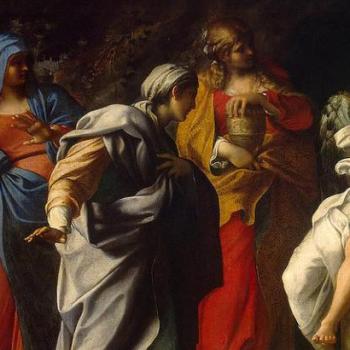Last year the church where I serve as teaching pastor, Keller Park Church (South Bend, Indiana), celebrated its 50th anniversary—or our very own year of Jubilee. To celebrate this occasion, I preached a series on the Jubilee theme as found in the Gospel of Luke (with allusions to Isaiah and Leviticus). Below is the first sermon of the series. (While you’re here, check out the first sermon, Revolution.)

Does anyone else remember learning this story as a kid—perhaps in Sunday school with a flannel graph—and thinking that it’s just about the craziest story you’ve ever heard?
For one thing, the old Bibles and Sunday school curriculum called this story the “Gerasene demoniac,” which sounds like the name of a death metal band.
And then this guy is described like the comic book He-man, with his clothes ripped off, roaming around among the tombs, and having to be chained hand and foot to constrain his bulking muscles. This man wasn’t just possessed by a demon; he was possessed by so many demons that they called themselves Legion—the perfect name for a horror flick.
Finally, Jesus doesn’t just cast out the demons and send them on their way; he sends them into a herd of pigs that immediately become suicidal.
So what’s going on in this story?
And, perhaps more importantly, how were we allowed to learn this story as kids?
Usually this story is taught as an example of Jesus’s power. He had just calmed a storm to display his power over nature; now he calms a demoniac to demonstrate his power over super-nature.
But while we certainly learn of Jesus’s power in this story, that simple lesson doesn’t account for all the strange elements of the story.
Is it possible that there’s more that Luke wants us to take away from this narrative?
In Jesus’s inaugural sermon in Luke 4, he read from the scroll of the Hebrew prophet Isaiah, particularly Isaiah 61:1–2:
The Spirit of the Sovereign Lord is on me,
because the Lord has anointed me
to proclaim good news to the poor.
He has sent me to bind up the brokenhearted,
to proclaim freedom for the captives
and release from darkness for the prisoners,
to proclaim the year of the Lord’s favor.
By proclaiming “the year of the Lord’s favor,” Jesus connects Isaiah’s message to an even old tradition, Leviticus 25, which describes the year of Jubilee.
This year of Jubilee, which Yahweh commanded Israel to celebrate every 50th year, is a call to the people to reset.
It is a year when land is redistributed, debts are remitted, slaves are redeemed, prisoners are released; a year when all things are reset, restored, renewed, recovered, reestablished, reconciled; a year of remembrance, rest, restitution, repentance, and rejoicing.
According to Jesus’s sermon in Luke 4, delivered in the synagogue of his hometown in Nazareth, this declaration of Jubilee was “good news”—literally, “gospel”—to the poor, the prisoners, the blind, and the oppressed.
But we learn almost immediately that this gospel, this declaration of Jubilee, was not viewed as good news by everyone.
Right in the middle of Jesus’s sermon, the congregation gets up, forms an angry mob, drives Jesus out of town, and tries to throw him off a cliff.
Four chapters later, we find that Jesus is undeterred.
In 8:1 we read that “Jesus traveled about from one town and village to another, proclaiming the good news [or ‘gospel’] of the kingdom of God.”
Then in verse 26, we come to our present story.
Jesus and his disciples sail “to the region of the Gerasenes, which is across the lake from Galilee.”
There Jesus encounters a demon-possessed man from the town. Aware that the man is demon-possessed, Jesus commands the evil spirit to come out of the man.
But the man is described as in utter agony and despair.
Luke’s description in verse 28 is startling: The man “cries out and falls at Jesus’s feet, screaming at the top if his lungs, ‘What do you want with me, Jesus, Son of the Most High God? I beg you, don’t torture me!’”
When I was a kid hearing this story, I assumed that this was the demon—or perhaps the spokesperson for the demons—crying out to Jesus for him not to torture them.
But that isn’t what the text says.
It says that the man begs Jesus not to torture him.
Later, in verse 31, we read that the demons beg Jesus repeatedly not to send them into the Abyss. But here it is the man begging not to be tortured.
We might surmise that this man has some idea what it is like to be tortured by well-meaning religious folk. It was probably “for the man’s own good” that they chained him down by his hands and feet and kept him under guard. They may have discussed how he wouldn’t be able to do further harm to “himself and others” if he were isolated in a safe place outside of town.
But his home among the tombs belies their high ideals. They locked him up in solitary confinement with a double-life sentence. For the sake of “law and order” in their town, they were willing to send this man away to his death.
But Jesus sees this man not as a terror to society, a “felon,” a “super-predator.” He steps into the man’s world and addresses him as a fellow human being.
“What is your name?” Jesus asks.
To Jesus, this naked, shackled demoniac is a person with a name.
The man has taken the town’s perception of him and has claimed it as his own. In order to claim some amount of agency, autonomy, and identity as his own, he’s taken his situation and made it his name: Legion.
And then Jesus—in an enactment of his Jubilee proclamation—gives freedom to this prisoner and releases this man from his oppression.
This is good news for the man! He quickly gets dressed and cleaned up and returns to sit at Jesus’s feet—immediately taking the posture of a disciple. He’s so committed to Jesus and his good news that verse 38 tells us he “begged to go with Jesus” just as earlier he had “begged” Jesus not to torture him and his demons had “begged” Jesus to let them go into the herd of pigs.
But instead of making this man an apostle, Jesus makes him an evangelist. “Return home and tell how much God has done for you,” he tells him in verse 39. And so the man goes back to his hometown filled not with demons but with the spirit of jubilee. He proclaims high and low how he has been set free—how he has been released from his bondage.
Luke subtlely shifts the language in verse 39: Jesus told the man, “tell how much God has done for you,” but Luke tells us that he went all over town telling “how much Jesus had done for him.” Jesus is not only proclaiming but also fulfilling Yahweh’s Jubilee.
And how can that be anything but good news?
Here’s one way: if it disrupts the local economy.
There’s no evidence that Israel ever actually celebrated Jubilee as prescribed in Leviticus 25. After all, who would ever voluntarily let their rightfully earned property be returned to its previous owner? Who would ever voluntarily let debts rightfully owed to them be remitted? Who would ever voluntarily let their slaves—their rightfully owned cheap and reliable workforce—be redeemed? Who would ever voluntarily let dangerous criminals—rightfully locked away for their crimes—be released back into society?
And so Jesus’s good news to the poor, brokenhearted, captive, and imprisoned is perceived as a threat to the rich, well-fed, safe, and secure.
Unlike the man formerly known as Legion who proclaims all over town what Jesus has done for him, we read in verse 34 that those tending to the recently suicidal herd of pigs “run off and report in the town and countryside” what has happened. They are not testifying to Jesus’s good news; they are reporting suspicious activity—alerting the townspeople to a new threat to their way of life. They are willing to sacrifice one man for the good of the town.
But Jesus, instead, sacrifices the good of the town for the sake of this one man.
When the townspeople arrive and see the man dressed and in his right mind, they respond not with rejoicing that their fellow townsperson has been cured but with fear. Fear that Legion might be faking it—just pretending to be reformed so that he can be free to wreak havoc on the town once more. Fear that Jesus might somehow further disrupt their local economy. Fear that all this Jubilee stuff might be bad for business.
And so, instead of begging for Jesus to stay with them so they can learn from him, we read in verse 37 that “all the people of the region of the Gerasenes ask Jesus to leave them.”
Why?
“Because they are overcome with fear.”
Jesus obliges.
He gets into the boat and leaves—perhaps stopping momentarily to shake the dust off his sandals before he goes.
When Jesus declares Jubilee in his day, it looks differently than when Yahweh prescribed it to Moses and the Israelites. By and large, the Jews in the first century no longer owned slaves, so it would hardly make sense for them to release any.
So Jesus finds another member of society who had been treated just as badly as a slave. He enters into that person’s situation and proclaims “Jubilee!” “You’re free!”
Similarly, most of us do not regularly encounter people possessed by a legion of demons, and we probably wouldn’t know what to do if we did.
Yet, are there not people in our community who are in just as much bondage and agony, if not more, than this man named Legion?
May we seek such people out, learn their names, and proclaim freedom from their oppression.
And then, as we go about proclaiming Jubilee, may we be willing to shake the dust off our feet when others respond not out of joy for the release of their fellow human but out of fear of the disruption to their own way of life.












